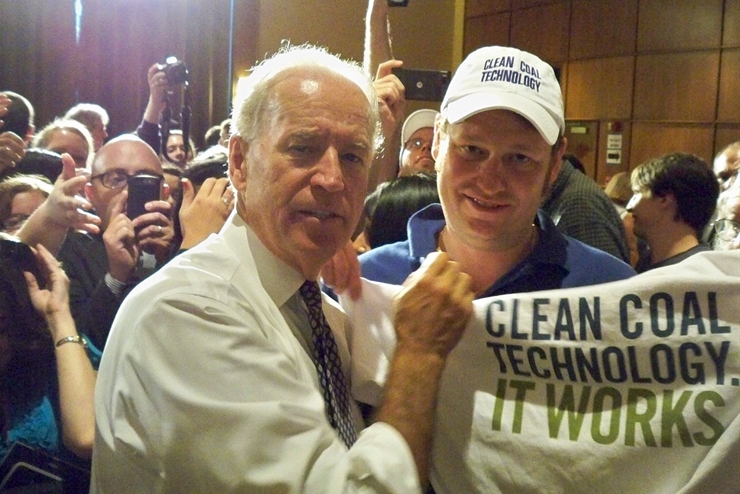While the results of the 2020 election aren’t yet certain, Joe Biden is proceeding with his transition and putting climate change and energy policy at the top of his agenda.
Biden assured voters during the debates that he does not support Congresswoman Alexandria Ocasio-Cortez’s Green New Deal plan, which envisions drastically cutting fossil fuel production to reduce greenhouse gas emissions and radically transforming America’s transportation and agricultural industries. Yet Biden’s website tells a different story. There we learn that Biden “believes the Green New Deal is a crucial framework for meeting the climate challenges we face.” Biden’s closest advisors routinely ask whether candidates for even low-profile appointments are “climate-ambitious,” according to The New York Times.
The prospect of anything close to a Green New Deal making its way into law should be terrifying to the nearly 1.1 million people employed by the American fossil fuel industry. These jobs accounted for 94.2 percent of total energy industry employment last year, and a Biden administration pursuit of Green New Deal-type legislation or orders would fundamentally transform and potentially cripple the industry.
This is particularly true for the parts of the industry that involve fracking, a relatively new technology that unlocked new oil and gas reserves, making the United States the world’s largest energy producer since 2014. In the final debate of the campaign, Biden assured Americans that he was not in favor of banning fracking, despite claims that he previously stated the opposite opinion. Trump gleefully posted a video containing multiple clips of Biden and his running mate Kamala Harris criticizing fracking and discussing proposals to limit the fossil fuel industry after Biden challenged him to do so.
If Biden and Harris were to follow through on their anti-fracking plans, average Americans could feel the pain at the pump. In the 2020 fiscal year, the real (inflation adjusted) price of a gallon of gasoline was $2.17, the lowest it has been since 2002’s price of $1.95. A green-all-over Biden administration could see the country’s gasoline prices return to the heady heyday of 2011 and 2012, when a gallon of gas averaged over four dollars. Well-to-do Americans may think that they can afford even a doubling of their fuel budgets for the sake of climate change, but the effects of higher fuel prices are felt in prices across the economy, as it will cost more to ship goods, power factories, and heat homes. It would increase inflationary price pressure across the economy at a time when Americans are already suffering from diminished economic activity due to COVID restrictions.
More costly fossil fuels aren’t the only thing that would affect prices. The ever-greater deficit spending that’s likely to come under a Biden administration is also likely to put pressure on the American economy. The investment bank Goldman Sachs estimated that the U.S. dollar could depreciate by 15 percent or more over the next three years, given that a Biden administration is likely to provide a large stimulus package while also raising corporate taxes and increasing regulations. While a stimulus check may take pressure off of suffering Americans in the short term, the long-term effects of an economy straining to support climate activism from the White House is less positive.
A “climate ambitious” administration may extend beyond the Department of the Interior and the Environmental Protection Agency. One can even speculate on various changes if Biden’s climate focused policy extends to positions in the Education and Transportation Departments.
A climate “woke” Department of Education would likely implement even more climate change curricula in our public schools. A climate-focused Department of Transportation may introduce bans on non-electric cars such as California is now implementing, a move which may do far more harm to the environment than good.
While he remains in office, Trump seems intent to engage in a little more policy making to help the non-renewable energy industry. The Trump administration recently announced a move to lease out federally held land in Alaska’s Arctic National Wildlife Refuge to oil and gas companies. The move would see potential leases signed just prior to Inauguration Day, undercutting Biden’s stated opposition to potential drilling expeditions. Thus, Trump may be considered “climate ambitious” as well, but he’s just dealing with the business climate and workers’ well-being first, while placing environmental concerns second.
What Trump hammered home on the campaign trail, and what Biden was at pains to deny, seems to be coming to fruition. Should Biden carry out these plans, voters who rely on the energy industry—which is every American who lives on the grid or drives a car—should pay careful attention to their effects.
—Edward Welsch contributed to this article.
Image Credit:
Above: Joe Biden with Clean Coal Technology [America’s Power, CC BY 2.0 , via Wikimedia Commons, cropped and resized]

Leave a Reply